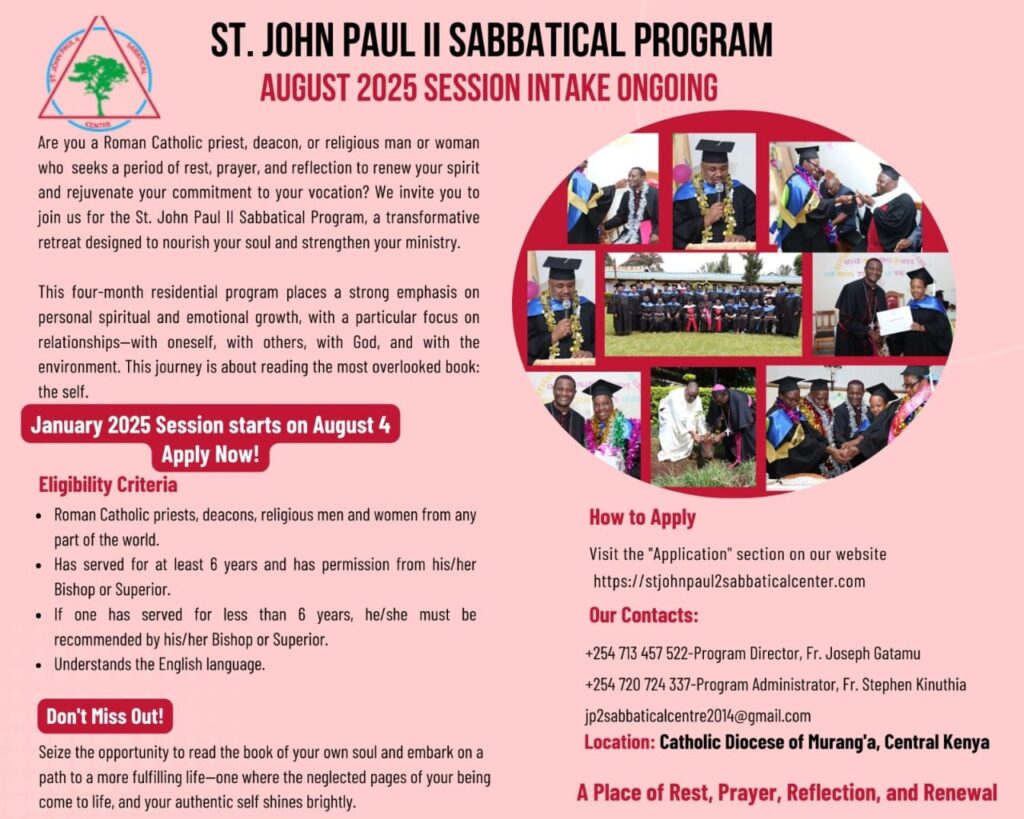
Fr. Maurice Kigame’s call to the priesthood began in an unexpected way. Growing up in the western part of Kenya, he traces his calling back to his primary school days, inspired by the Guadalupe Fathers who served in his parish and frequently visited his school. “My father insisted that, being Catholic, we should go to a Catholic school. And I never knew it was there that I would get the vocation to become a priest,” he recalls. The priests’ and seminarians’ visits and talks captured his imagination.
He also remembers a particular nun from that parish—a Sister of Mary of Kakamega—who would come to speak to them. “She was always neat, in a very clean white habit. At first, I thought I wanted to become a sister—I didn’t even know I could become a priest!”
Over time, these encounters, together with encouragement from priests, seminarians, and religious serving in the parish, helped Fr. Maurice’s vocation slowly take shape.
Fast forward 27 years, Fr. Maurice has dedicated his life to the Catholic Church, serving most recently for six and a half years at Christ the King Amalemba Parish in the Catholic Diocese of Kakamega. But after nearly three decades of ministry, he found himself exhausted and worn out. “After such a long period of work without a break, I realized I was not productive enough,” he explains. “I felt I needed some renewal to re-energize myself and get back on track.”
This need for renewal led him to join the 24th session of the St. John Paul II Sabbatical Program, where he spent four months resting, praying, and reflecting about his life and calling. While his initial intention was simply to rest, he soon discovered that the experience was much deeper. “The courses offered here helped me come in touch with myself. I began to understand why some things happen, why I react the way I do, and I got grounded. It helped me not only understand myself better but also the people I work with.”
The sabbatical session, which concluded on May 9, also offered Fr. Maurice a unique opportunity to connect with priests and religious from around the world. This cultural and spiritual diversity enriched his experience. “Although we come from different backgrounds, we share a lot in common. The sharing and engagement with others added richness to my stay and will greatly benefit my ministry.”
The Kenyan cleric praises the facilitators for their patient and loving approach. “Their commitment and understanding created a truly supportive environment, and I want to thank them wholeheartedly. Everyone here has shown us great love and patience, always striving to understand us rather than judge.”
Thanks to the workshops and lectures by the facilitators, he says, “I’ve been able to work on a few areas where I felt weak. Though I know those challenges aren’t completely gone, I’m committed to continuing that work. And I’m confident that if those issues arise again, I’ll know how to handle them.”
Reflecting on his many years of dedicated service among the people of God in Kenya, Fr. Maurice expresses no regrets. “Though there have been challenges, by the grace of God, they were always manageable. I am grateful for this journey and would choose this path again without hesitation.”
He strongly recommends the sabbatical program to other priests and religious. “It is a vital program. If possible, all of us should undertake it. I feel stronger and more productive now because of this experience. I’m really grateful for this centre—it’s been worth every moment.”
Meanwhile, applications for the 25th session—beginning August 4, 2025—are now open. The Program is available to priests and religious men and women worldwide who have served for at least five years.
To apply, please visit https://stjohnpaul2sabbaticalcenter.com/application/ to apply.

